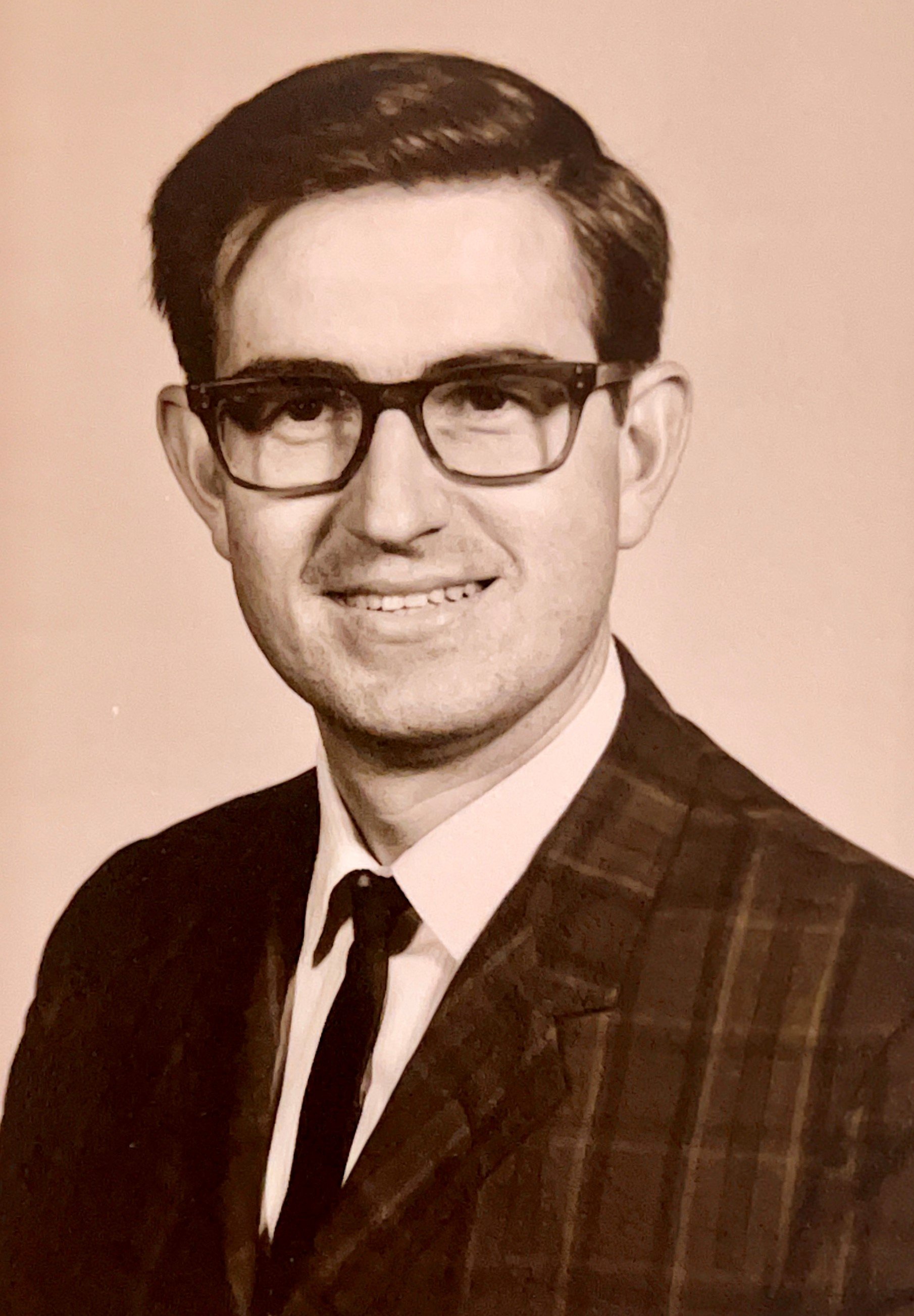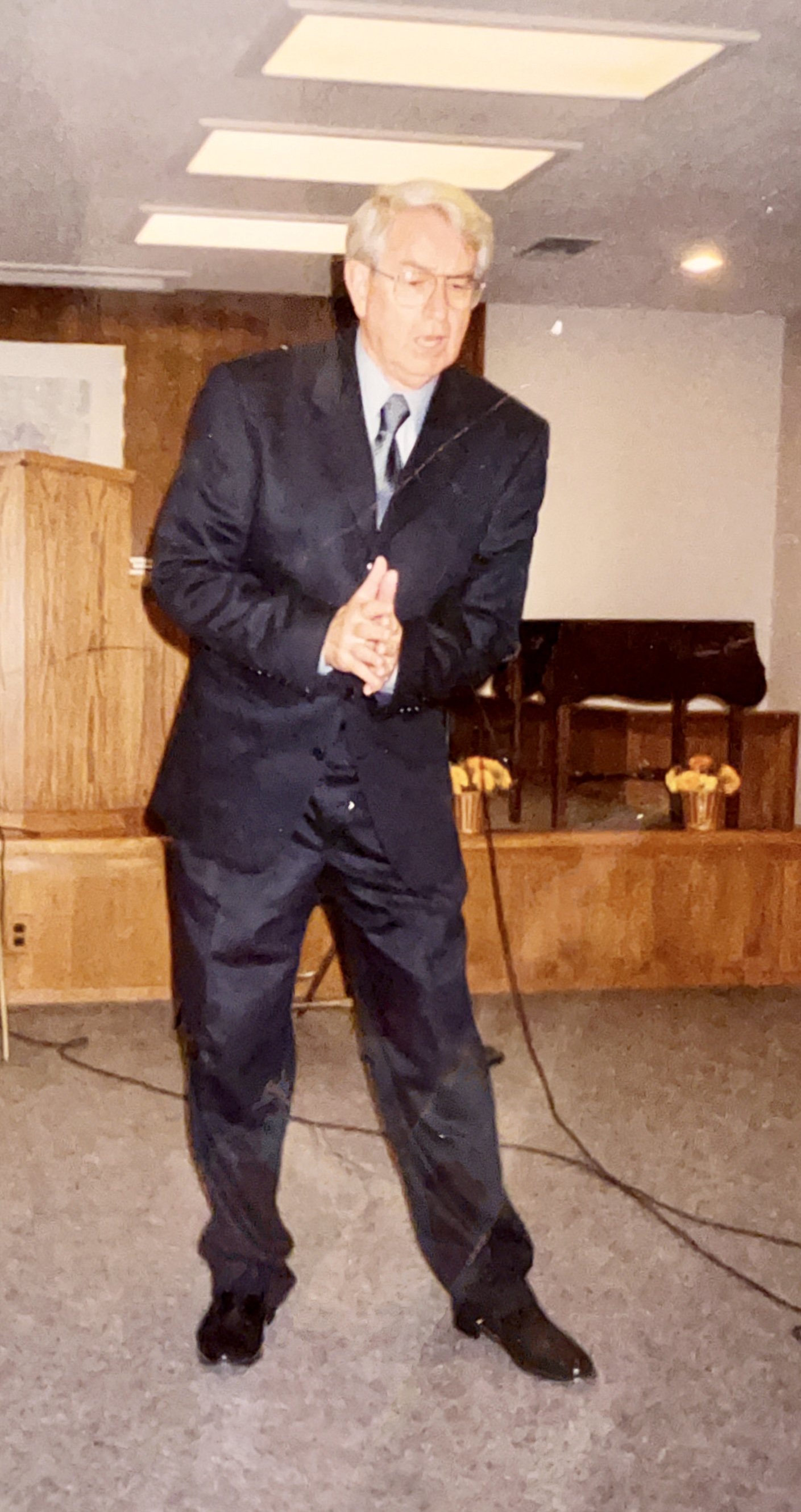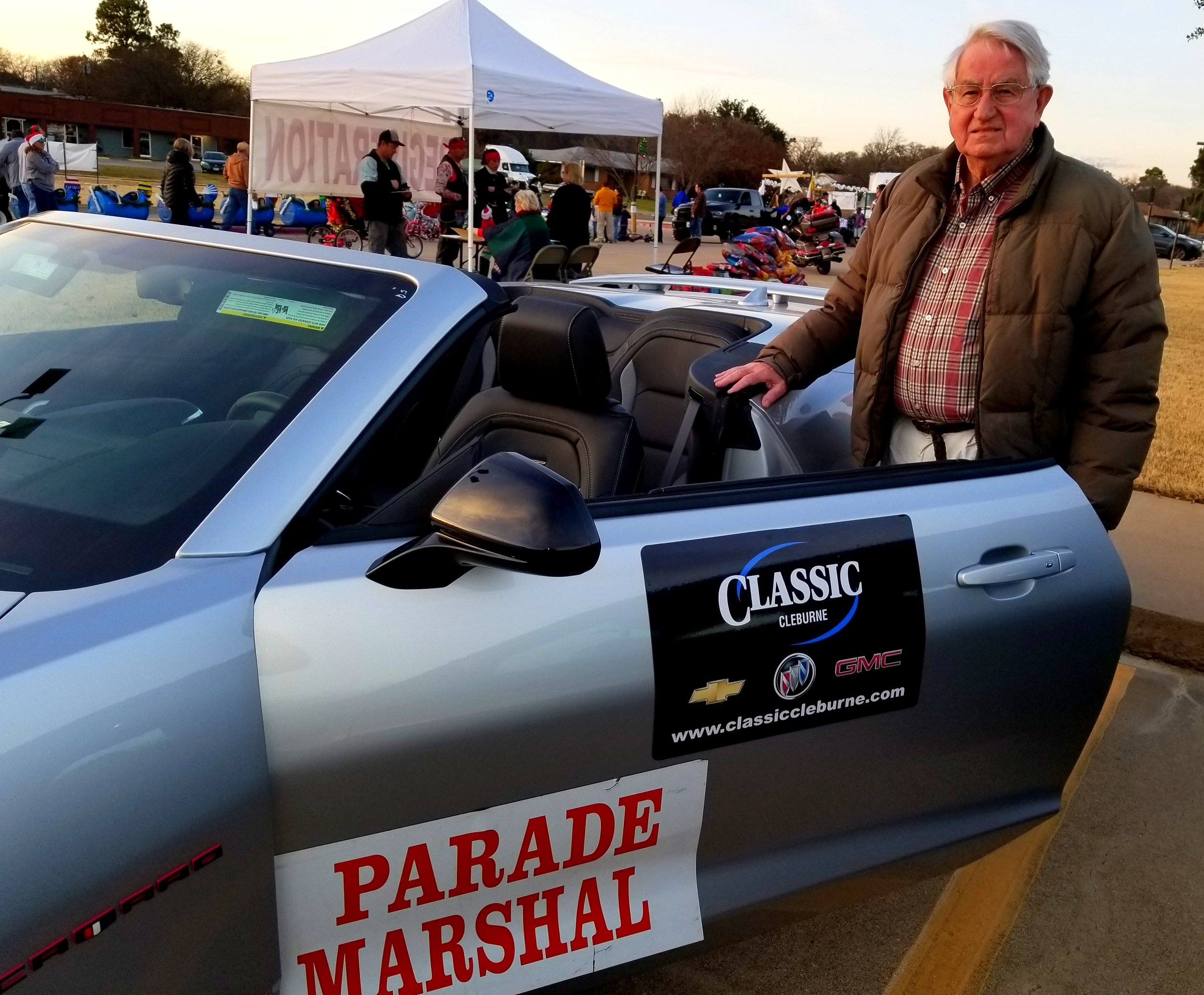My father passed away a few days ago. He lived a remarkable and a very Adventist life, holding denominational jobs for 39 years, beginning at Campion Academy when he was 20 years old. My sense of duty toward the Adventist Church and its message, and my desire to be fighting on the side of the angels during turbulent times, were instilled in me by my father. That all came from him. I honor him here with this life sketch:
John William Read was born on April 25, 1933, to Delbert Read and Ella McCoy Read of Lufkin, Texas. John was the youngest of six children: Clarice, Delbert known as “Sleepy,” Wallace, Betty, Billy Mac and John. When John was just a few months old, his father, an auto mechanic, was killed in an accident while working under a car.
John grew up in Lufkin and taught Sabbath School at the Lufkin SDA Church. At a young age, John learned to play piano, largely teaching himself; he also learned both the baritone horn and the trombone. In his sophomore year of high school, based upon his conviction about the Sabbath, he told his band director that he would not play at Friday Night football games.
John was an achiever; he graduated from Lufkin High School in 1949, at the precocious age of 16. He and his brother Billy Mac then headed to Madison College, a self-supporting Seventh-day Adventist school near Nashville, Tennessee, whose location Ellen White was shown in a dream; Madison was the only school whose governing board Mrs. White served on.
Attending Madison sparked in John a life-long interest in self-supporting Adventist ministries, and in later years when ASI (Adventist Layman’s Services and Industries) was established, he was one of the earliest to join that organization. His real estate brokerage annually renewed its membership in ASI, and he frequently attended the summer conventions. They had the revival spirit of old-time camp meetings that John related to and enjoyed.
At Madison, John was active in all the musical organizations; he studied piano with Sarah Ann Goodge and Sylvia Mitzelfelt, and worked for the band director, Harold E. Mitzelfelt. At Madison, John met and fell in love with Aquila Patterson, a musically gifted young lady from Panama City, Florida; they were married August 30th, 1953, at Madison College, when they were both 20 years old. The marriage lasted almost 64 years, until Aquila’s death in 2017.
After the wedding, John began a career in Adventist education and ministry that would span almost four decades, taking a call to Campion Academy in Loveland, Colorado, where John directed the band. (John could play several wind instruments and was a competent band director, but he always preferred choir.) At Campion Academy, John and Aquila’s first son, John Clayton, was born.
Soon the Reads were called to Shenandoah Valley Academy in New Market, Virginia, where John directed the band and the choir, and Aquila taught voice and piano. Their second son, Campion was born during the Shenandoah years. One of their Shenandoah students, Donna Lee Tucker, was later to marry their son John Clayton Read. During the summers, John and Aquila returned to Texas where John was working on a Master’s Degree in Music from the University of Texas at Austin, which he completed in 1958.
The seven years at Shenandoah were happy ones, and John was popular among, and fondly remembered by, his academy students. He would later refer to his years at Shenandoah as some of the most rewarding of his life. John and Aquila sponsored the classes of 1959 and 1961, and several times returned to New Market to celebrate class reunions with the alumni who graduated in those years.
In 1962, John was called to be the choir director at Southwestern Junior College. Except for three years spent in the Rio Grande Valley, John and Aquila would live in Keene for the rest of their lives. During the early years at Keene, John and Aquila’s daughter, Melissa, and son, David, were born.
John and Aquila’s close friends during these years included Jack and Wilma McClarty, who were, respectively, the band director and an English teacher at the college, and Gene and Grace Thomsen—Gene was a language teacher who eventually was appointed academic dean of Southwestern.
While at Southwestern, John earned a doctorate in education from the University of North Texas at Denton. This necessitated many long trips to Denton, and time away from his young family. He completed his dissertation and doctorate in 1968. Part of the impetus for the doctorate was that Southwestern was becoming a senior college, and needed qualified, credentialed faculty. Southwestern transitioned to a senior college in 1966, with full accreditation being awarded in 1970.
He served as chairman of Southwestern’s music department, and remained on the staff for 18 years. One year, after Jack and Wilma McClarty took a call to Southern, John directed both the college band and the college choir. He sought to model his music department after UNT’s rigorous music program. He also began participating in singing competitions sponsored by NATS, the National Association of Teachers of Singing. In 1979-1980, his last year at Southwestern, two of John’s students were semi-finalists, and one was a finalist in regional competition.
Once during the tenure of President LeRoy Leiske in the early 1970s, John’s brother Billy Mac Read came from Florida and decided the old building called Heritage Hall, where the music department was then located (on what is now the site of Chan Shun Library), needed a facelift. The facelift included very long, orange shag carpet in the lobby between John’s office and Bill Bromme’s office. Don’t laugh. It was very much the style at the time.
Highlights of John’s years at Southwestern included taking the college choir, the Choraliers, to the World Youth Congress in Zurich, Switzerland, in 1969, to Romania in 1976, and finally to Poland in 1980. John was extremely busy in those years, raising the money for those trips and preparing the choirs, but the experiences were priceless. The Romania trip was the largest, with 60 choir members filling two tour buses, and making a three-week circuit of the country.
In Romania, the Adventist presence was (and is) large, and the choir concerts created quite a stir. Remember that Romania was a communist country at that time, behind the iron curtain, and the choir was followed and monitored by Nicolae Ceaușescu’s secret police. The communist authorities eventually forbade the Choraliers to sing sacred music, but John was able to win a carve-out for the Negro Spirituals and the Battle Hymn of the Republic, given the historical and cultural significance of those works. This exception nearly swallowed the rule. During the fall semester, John gave a one hour and 45-minute Friday night vespers program, with pictures, telling the Romania stories. After he was done—finally--it was announced, “Needless to say, there will be no afterglow service.”
During these years John was usually raising money for something. In the Fall of 1976, the Read Family, as part of the Lyceum Series, gave a Sabbath evening vespers concert with all of the family performing. We still have the recording of that concert, and halfway through, John “could not constrain himself”—those were his words—from making a plea for funds to supplement the college music department’s equipment budget. He and Shirley Beary had toured DFW piano dealers, and realized that to purchase the three studio grand pianos they wanted, they would need more than half-again as much as they were allocated. So please, please give for this worthy cause. Remember that this was just months after having raised many thousands to take sixty choir students to Romania. But that was John Read.
John and Aquila, an organist, were very proud of the twelve-rank, two-manual Casavant pipe organ that John was able to obtain for the college at reasonable cost. It was installed in Evans Hall, which was then the campus recital and concert auditorium.
Speaking of supplementing, during these years John sought to augment his modest teaching salary and support his growing family with various side gigs: He sold music libraries, stop-smoking kits, and term life insurance, among other things, and was for several years the choirmaster at Saint Marks Methodist Church on West Henderson Street in Cleburne. He seemed to have the drive and energy of three men. John’s most significant moonlighting was selling real estate. His mother Ella, who had married a retired Angelina County Sherriff named Henry Billingsley, was a real estate broker. John got his real estate sales license around 1971, and worked under his mother’s broker license, launching Read-Billingsley Real Estate.
After his teaching career at Southwestern ended in 1980, John moved into administrative work for the Texas Conference, becoming the Conference Church Music Coordinator, a position that he created. Ever the fundraiser, he also raised the money to pay his own salary.
As he was visiting churches around the conference, he saw a need for choral music that was of good quality yet simple enough that amateur choir members could learn and perform it. To meet this need, he founded Clarion Call Music. Clarion Call Music published over a dozen choral octavos, a book of solos and duets, and a small blue cloth-bound hymnbook called The Chapel Hymnbook. In a few minutes, the University Singers will perform one of Clarion Call Music’s publications: “I Will Arise and Go to Jesus,” arranged by John Read.
John next moved into pastoral work, pastoring districts in and around Dallas, and becoming an ordained minister. He became adept at delivering sermons, but even while pastoring churches, his first love was music. For example, while he was an associate pastor of the Dallas Central Church, he put on a very memorable performance of the Messiah, with guest soloists and a full orchestra.
Almost as soon as David’s voice changed in the late 1970s, John and David began performing the “Hale & Wilder” arrangements of sacred hymns and songs. The duets, usually accompanied by Aquila, were frequently heard at churches, Sabbath Schools and family gatherings, whenever John and David were together, for about 35 years, from 1979 through 2014.
From 1982 through 1984, John was on the hymnal committee that produced the 1985 Seventh-day Adventist Hymnal. In those low-tech days, John would come home from the committee meetings with suitcases full of photocopied hymns, all candidates for inclusion in the new hymnal. His younger children drew the unenviable task of cropping the photocopies, hole-punching them, and putting them in notebooks alphabetically organized by title.
John and Aquila became very active in the Seventh-day Adventist Church Musicians Guild, a group formed in 1970 that become a national organization in 1976. John served as president of the Keene chapter, then vice-president and president of the national association. During his two-year term as president of the national association, from 1984 to 1986, John planned a national convention that was held on the SWAU campus in 1986.
After pastoring the Garland-Plano district, and being associate pastor of the Dallas Central Church, John was asked to serve as principal of Greater Dallas Academy. This led, in 1989, to John accepting a call to Valley Grande Academy in Weslaco, Texas. John served as principal and Aquila taught music, history, and other subjects.
In 1992, John and Aquila returned to Keene and renovated their dream house on Bluebonnet Trail, which they had built in 1973. Bluebonnet Trail was part of Songbird Acres, a subdivision with three streets and 54 lots that John had developed as a realtor in the early 1970s. Jerry Becker, who read this life sketch at the funeral, told of how John was able to get them into a home on the other end of Bluebonnet Trail with no money down, creatively obtaining a down payment loan from the builder. Jerry and Linda Becker still live in the home John sold them in 1973.
For the first time in 39 years, John took a full-time job outside of the Adventist denomination, at Odyssey Harbor, a state-funded institution for abused and neglected children. John preached and taught, Aquila taught and did music therapy, and brother Sleepy Read did art therapy.
John also reactivated Read-Billingsley Real Estate, which had been dormant for over a decade. This time he was the broker. In these decades of his third and final career, John or agents working at his brokerage sold many of the houses in Keene, some of them twice, and few of them three times. He joined the Johnson County Association of Realtors and seldom missed one of their monthly luncheons or their annual banquet, and sometimes participated in their social activities, like bowling, just for the sake of fellowship.
Read-Billingsley Real Estate was one of the first businesses to join the Keene Chamber of Commerce. John was a regular at the monthly chamber luncheons, and typically bought a table at the annual Chamber banquet. Civic boosterism came naturally to John Read, because he loved people and wanted everyone to succeed. He understood that every other man’s success made his success easier and more likely, and vice versa.
John was fascinated by family connections, and always wanted to know how the person he was talking to was related to others among his friends and acquaintances. Genealogy was a lifelong passion for John; he researched his family history and published an illustrated booklet containing his findings.
Even in his final career—full-time real estate sales and property management—John continued his life-long love affair with music. In several years during the mid-1990s, John recruited and directed a Keene Church Community Choir, again performing the Messiah at the Keene Church. Over the decades, John and Aquila sang and played at countless weddings and funerals; they were extraordinarily generous with their time and talent.
John continued to support the SWAU music department, attending recitals and concerts when he could. Around the year 2000, although he was long retired from academic music, John, accompanied on the piano by Dr. John Boyd, performed a lecture recital, in which he sang Italian aria, German Lieder, oratorio, English art songs, and musical comedy.
John loved the “Evening at the Meyerson,” when SWAU instituted that tradition; he typically had Read-Billingsley purchase a balcony box at that elite Dallas performing arts venue, which he and Aquila would then share with invited guests.
John was usually pressed into service in Aquila’s Sunday church choirs for special Christmas and Easter performances—that’s just part of marriage—and Aquila almost always had a Sunday church job, including 18 years at Holy Comforter and 25 years at First Presbyterian in Cleburne.
All of John and Aquila’s children inherited their parents’ love of music. Their oldest son Clayton is a cowboy singer who has performed hundreds of concerts in Texas and even in Europe, their son Campion, a physician, is an accomplished pianist, their daughter Melissa has recorded an album of jazz/pop standards, and David has been a church choir section leader and frequent chorister and soloist.
When summarizing a man’s life, one can fall into the trap of producing a resume or curriculum vitae that fails to capture the spirit of the man. John’s was a kind and gentle spirit. His sister Betty, who worked for him at the real estate office for many years, noted that he never said a harsh word to her in her entire life.
John was generous to a fault; all the instances and ways he helped people are known to God alone, but we know they were numerous. He was unstintingly generous to his children. When denominational publishing houses turned down’s David’s 600-page manuscript called “Dinosaurs—An Adventist View,” John did not hesitate to publish it himself. “It was God thing,” he said. They created Clarion Call Books, an offshoot of Clarion Call Music, to publish the book, and John immediately got behind the printing and marketing of the book, including promoting it at ASI conventions.
So John Read “died in a good old age, full of days and riches and honor.” (1 Chron. 29:28) Well, John was far too generous to have accumulated great monetary wealth, but he was rich in the George Bailey sense—in the love and esteem of his friends, neighbors, former students, and former choir members. And he was honored. He was the Grand Marshal of the Keene 4th of July parade, the Marshal of the Keene Christmas Parade, and the winner of the Keene Chamber of Commerce’s 2018 Pioneer Award, honoring those “whose long-ago contributions and influence helped make Keene what it is today.”
Yes, John needed the saving grace of Jesus Christ, as we all do, but he was zealous and energetic in doing good, as God gave him to see the good. That was his character. John Read “fought the good fight, kept the faith, and finished the race.” (2 Tim. 4:7). He ran a good one.
Those who would like to see the musical and educational legacy of John Read continue should donate to the John Read Choral Scholars Fund at SWAU.
I heard a voice from heaven saying unto me, write, “Blessed are the dead who die in the Lord from now on.” “Yes,” says the Spirit, “that they may rest from their labors; for their works follow with them.” “ Revelation 14:13.






